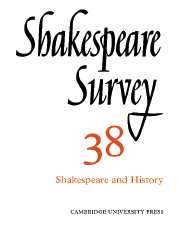Book contents
- Frontmatter
- Shakespeare’s History Plays: 1952–1983
- Shakespeare and History: Divergencies and Agreements
- Shakespeare’s Georgic Histories
- The Nature of Topicality in Love’s Labour’s Lost
- The Tragic Substructure of the Henry IV Plays
- Hal and the Regent
- The Rite of Violence in I Henry IV
- The Fortunes of Oldcastle
- Hand D in Sir Thomas More: An Essay in Misinterpretation
- Livy, Machiavelli, and Shakespeare’s Coriolanus
- Henry VIII and the Ideal England
- The Strangeness of a Dramatic Style: Rumour in Henry VIII
- ‘Edgar I Nothing Am’: Figurenposition in King Lear
- ‘Very like a whale’: Scepticism and Seeing in The Tempest
- Shakespeare’s Medical Imagination
- Shakespeare in the Theatrical Criticism of Henry Morley
- Shakespeare Performances in Stratford-upon-Avon and London 1983–4
- The Year's Contributions to Shakespearian Study 1 Critical Studies
- 2 Shakespeare’s Life, Times and Stage
- 3 Editions and Textual Studies
- Index
The Nature of Topicality in Love’s Labour’s Lost
Published online by Cambridge University Press: 28 March 2007
- Frontmatter
- Shakespeare’s History Plays: 1952–1983
- Shakespeare and History: Divergencies and Agreements
- Shakespeare’s Georgic Histories
- The Nature of Topicality in Love’s Labour’s Lost
- The Tragic Substructure of the Henry IV Plays
- Hal and the Regent
- The Rite of Violence in I Henry IV
- The Fortunes of Oldcastle
- Hand D in Sir Thomas More: An Essay in Misinterpretation
- Livy, Machiavelli, and Shakespeare’s Coriolanus
- Henry VIII and the Ideal England
- The Strangeness of a Dramatic Style: Rumour in Henry VIII
- ‘Edgar I Nothing Am’: Figurenposition in King Lear
- ‘Very like a whale’: Scepticism and Seeing in The Tempest
- Shakespeare’s Medical Imagination
- Shakespeare in the Theatrical Criticism of Henry Morley
- Shakespeare Performances in Stratford-upon-Avon and London 1983–4
- The Year's Contributions to Shakespearian Study 1 Critical Studies
- 2 Shakespeare’s Life, Times and Stage
- 3 Editions and Textual Studies
- Index
Summary
Love’s Labour’s Lost remains something of an anomaly among Shakespeare’s plays. Of all his comedies, this one is still often perceived as narrowly aristocratic, an obscure piece of coterie drama never truly intended to appeal to a general audience. This view has been formed by the massive commentary on the play’s references to the Harvey–Nashe controversy, Raleigh’s supposed ‘School of Night’, and other ‘topical puzzles’ still referred to, often in passing or in footnotes, by even the best and most recent scholarship. A re-examination of existing evidence about the probable original audience for Love’s Labour’s Lost casts grave suspicions on the kind of topicality understood only by Renaissance courtiers. Yet topicality itself cannot be altogether dismissed in a play for which the major male characters – the King of Navarre, Boyet, Marcade, Armado, Moth, Berowne, Longaville, and Dumain – were all named after military leaders then waging a civil war in France. In this essay, I argue that Love’s Labour’s Lost was no more or less ‘aristocratic’ in appeal than Shakespeare’s other earlier plays, that what topicality it possesses was available to a wide audience, and that, finally, we need to revise our way of looking at topicality at least in Love’s Labour’s Lost and perhaps in other plays, as well.
- Type
- Chapter
- Information
- Shakespeare Survey , pp. 49 - 60Publisher: Cambridge University PressPrint publication year: 1986
- 1
- Cited by

